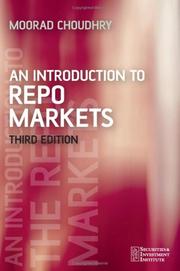| Listing 1 - 10 of 39 | << page >> |
Sort by
|

ISBN: 0470017562 Year: 2006 Publisher: Chichester Wiley
Abstract | Keywords | Export | Availability | Bookmark
 Loading...
Loading...Choose an application
- Reference Manager
- EndNote
- RefWorks (Direct export to RefWorks)
1. Introduction to repo 2. Market background 3. The mechanics of repo 4. Basket repo, synthetic repo and structured finance repo 5. The UK gilt repo market 6. Overview of repo trading and the futures contract implied repo rate 7. Repo and the yield curve 8. The global master repurchase agreement 9. Accounting, tax and regulatory capital issues in repo

ISBN: 0273625896 Year: 1997 Publisher: London Pitman
Abstract | Keywords | Export | Availability | Bookmark
 Loading...
Loading...Choose an application
- Reference Manager
- EndNote
- RefWorks (Direct export to RefWorks)

ISBN: 1843741202 Year: 2004 Publisher: London Euromoney
Abstract | Keywords | Export | Availability | Bookmark
 Loading...
Loading...Choose an application
- Reference Manager
- EndNote
- RefWorks (Direct export to RefWorks)
Year: 2020 Publisher: [Washington, D.C.] : Congressional Research Service,
Abstract | Keywords | Export | Availability | Bookmark
 Loading...
Loading...Choose an application
- Reference Manager
- EndNote
- RefWorks (Direct export to RefWorks)
Repurchase agreements --- Repurchase agreements --- Law and legislation
Periodical
Year: 2020 Publisher: [Washington, D.C.] : Congressional Research Service,
Abstract | Keywords | Export | Availability | Bookmark
 Loading...
Loading...Choose an application
- Reference Manager
- EndNote
- RefWorks (Direct export to RefWorks)
Repurchase agreements --- Repurchase agreements --- Law and legislation
Book
Year: 2010 Publisher: Washington, D.C. : International Monetary Fund,
Abstract | Keywords | Export | Availability | Bookmark
 Loading...
Loading...Choose an application
- Reference Manager
- EndNote
- RefWorks (Direct export to RefWorks)
The objective of the joint Bank-Fund debt sustainability framework for low-income countries is to support LICs in their efforts to achieve their development goals without creating future debt problems. Countries that have received debt relief under the Heavily Indebted Poor Countries (HIPC) Initiative and the Multilateral Debt Relief Initiative (MDRI) need to be kept on a sustainable track. Under the framework, country DSAs are prepared jointly by Bank and Fund staff, with close collaboration between the two staffs on the design of the macroeconomic baseline, alternative scenarios, the debt distress rating, and the drafting of the write-up.
Book
Year: 2008 Publisher: Washington, D.C. : International Monetary Fund,
Abstract | Keywords | Export | Availability | Bookmark
 Loading...
Loading...Choose an application
- Reference Manager
- EndNote
- RefWorks (Direct export to RefWorks)
In September 2007, the UN Secretary General launched the Millennium Development Goals (MDG) Africa Steering and Working Groups. The Steering Group brings together the leaders of multilateral institutions to identify practical steps needed for Africa to achieve the MDGs. The Managing Director of the IMF is a member of the Steering Group. The Working Group supports the Steering Group and is comprised of thematic groups in education, agriculture, health, infrastructure and trade facilitation, statistics, aid predictability, and MDG operationalization at the country level. The following three notes assess the macroeconomic implications of the spending of scaled-up aid to Benin, Niger, and Togo in line with that promised by the G-8 at Gleneagles, Scotland in 2005.
Book
Year: 2009 Publisher: Washington, D.C. : International Monetary Fund,
Abstract | Keywords | Export | Availability | Bookmark
 Loading...
Loading...Choose an application
- Reference Manager
- EndNote
- RefWorks (Direct export to RefWorks)
In May 2007, the IMF and World Bank Boards discussed the paper "Strengthening Debt Management Practices: Lessons from Country Experiences and Issues Going Forward". In those discussions, the Boards of both institutions endorsed a public debt management (PDM) work program that was particularly focused on strengthening frameworks and capacity in low-income countries (LICs). This comprised three main elements: (i) develop a toolkit to help LICs formulate an effective Medium-Term Debt Management Strategy (MTDS) and apply it in 4-6 countries a year; (ii) undertake debt management performance assessments; and (iii) continue the provision of debt management and domestic market development technical assistance (TA) and advisory services to middle-income countries (MICs). This paper is a response to the Boards' request for an update on the development and implementation of that work program. Developing a Medium-Term Debt Management Strategy (MTDS)- Guidance Note for Country Authorities Debt Management Performance Assessment Tool (DEMPA) Developing a Medium Term Debt Management Strategy: User Guide and Analytical Tool - In March 2009, the Executive Boards of the World Bank and the IMF endorsed the Medium Term Debt Management Strategy (MTDS) Framework developed by IMF and World Bank staff to help countries elaborate effective debt management strategies. The MTDS framework and toolkit comprises two elements: An operational guidance note (GN) and a spreadsheet-based analytical tool (AT). The GN provides practical guidance on the process of developing an effective MTDS, describing each step involved, while the AT provides quantitative analysis to guide the MTDS decision-making process.
Book
ISBN: 9080802816 Year: 2002 Publisher: Nijmegen Katholieke universiteit Nijmegen
Abstract | Keywords | Export | Availability | Bookmark
 Loading...
Loading...Choose an application
- Reference Manager
- EndNote
- RefWorks (Direct export to RefWorks)
Book
ISBN: 1498374379 Year: 2008 Publisher: Washington, D.C. : International Monetary Fund,
Abstract | Keywords | Export | Availability | Bookmark
 Loading...
Loading...Choose an application
- Reference Manager
- EndNote
- RefWorks (Direct export to RefWorks)
In September 2007, the UN Secretary General launched the Millennium Development Goals (MDG) Africa Steering and Working Groups. The Steering Group brings together the leaders of multilateral institutions to identify practical steps needed for Africa to achieve the MDGs. The Managing Director of the IMF is a member of the Steering Group. The Working Group supports the Steering Group and is comprised of thematic groups in education, agriculture, health, infrastructure and trade facilitation, statistics, aid predictability, and MDG operationalization at the country level. The following three notes assess the macroeconomic implications of the spending of scaled-up aid to Benin, Niger, and Togo in line with that promised by the G-8 at Gleneagles, Scotland in 2005.
| Listing 1 - 10 of 39 | << page >> |
Sort by
|

 Search
Search Feedback
Feedback About
About Help
Help News
News